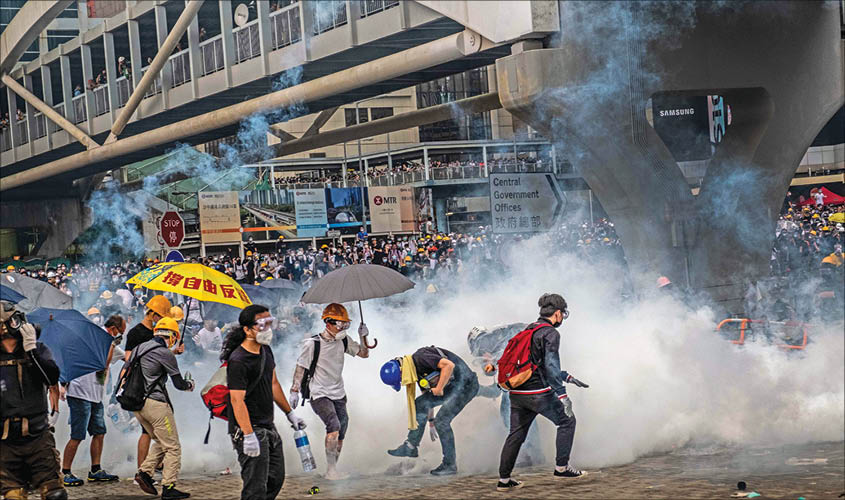The Bill has led to an uproar in the territory and the most violent street protests.
Fractures in the Hong Kong government widened Friday over an unpopular bill that would allow extraditions to mainland China, which has led to an uproar in the territory and the most violent street protests in years.
Hong Kong’s Beijing-appointed chief executive, Carrie Lam, has stridently defended the bill and denounced the protesters. But one of her top advisers and a pro-Beijing lawmaker added their voices on Friday to calls for delaying the measure—evidence that Lam’s hard-line position may be backfiring.
The discord has laid bare the unease roiling Hong Kong over what many view as increasingly brazen moves by China to curtail civil liberties in the former British territory, despite China’s pledges to guarantee its autonomy after the handover 22 years ago.
Bernard Chan, a member on a top body that advises Lam, said it would be impossible to rush through the bill, with the city on edge after street clashes punctuated by police volleys of tear gas and rubber bullets at protesters opposed to the legislation. And lawmaker Michael Tien became the first member of the legislature’s pro-Beijing faction to openly call for a delay of the bill’s passage.
“If things continue to move in the wrong direction, I am worried that the government will find it harder to win the trust of its friends and I worry about Hong Kong’s governance prospects,” Tien wrote on his Facebook page.
The remarks could signal that public pressure is forcing Hong Kong’s pro-Beijing faction, which has been a staunch supporter of Lam on the extradition issue, to speak out against it. Lam, who called off a planned appearance at a technology conference on Friday, has not commented on the issue since Wednesday night, when she urged the public to help restore order.
Chan, the convener of the Executive Council, told a local radio station that the massive downtown street conflict between police and demonstrators on Wednesday had forced a rethink of the government’s earlier plan to put the bill up for a vote by next week.
The police have said they used force on Wednesday to suppress protesters who had tried to storm the territory’s Legislative Council to prevent a reading of the bill. But the crackdown also left thousands of peaceful protesters choking on tear gas and many others smarting from pepper spray or injured by rubber bullets.
The government later said that 81 people had been injured, and the authorities were heavily criticized as video that appeared to show police officers using excessive force circulated on social media.
“There is so much misunderstanding, and on Wednesday we all witnessed very saddening events we don’t want to see,” Chan told the station RTHK. “So we really need to review this bill again—to explain this in detail again would be one option.”
The intense public outcry against the bill comes from a fear that it would put Hong Kong’s residents and visitors at risk of being detained and sent to China for trial by the country’s Communist Party-controlled courts. Underlying the opposition is a growing fear that the freedoms people in Hong Kong enjoy under the “one country, two systems” policy, put in place when Britain returned Hong Kong to China in 1997, are rapidly shrinking.
In a sign of the international pressure on Lam, a bipartisan group of US lawmakers introduced a bill Thursday calling for a broad review of Washington’s relationship with Hong Kong. The bill would require the US secretary of state to affirm every year that the territory remains sufficiently autonomous from the Chinese mainland to deserve special treatment.
On Friday, Geng Shuang, a spokesman for China’s Foreign Ministry, accused the American lawmakers of making “irresponsible” remarks and “violently” interfering in China’s internal affairs. The Chinese government summoned a senior American Embassy official in Beijing to complain about the congressional measure.
After the protests and clashes on Wednesday, the Hong Kong legislature’s president delayed debate on the extradition bill through Friday. No date has been set for when the legislature will resume meeting. Further protests against the bill are planned for Sunday, and activists have called for schools, shops and workers to go on strike on Monday, in another effort to stop the bill from passing.
The South China Morning Post newspaper reported on Friday that 22 former top officials and lawmakers in Hong Kong had asked Lam in a letter to “yield to public opinion and withdraw the bill for more thorough deliberation.” They also urged her advisers to resign if their pleas to that effect are ignored.
“A deeply divided society, serious concerns of the international community —are these the sacrifices to be made to satisfy the will of the chief executive?” they wrote, as reported by the newspaper. “What great public interest is supposed to be served by the hurried passage of this bill?”
Criticism of the government and the police has put significant political pressure on Lam, who was selected by China’s leaders to govern Hong Kong two years ago and has championed the bill. But so far, she has shown no sign of backing down. On Wednesday, she called the demonstration an “organised riot” and compared the protesters—mostly young people in their 20s and 30s —to spoiled children.
Chan said on Friday that his primary concern was ensuring that conflict between protesters and the authorities did not escalate.
© 2019 The New York Times

